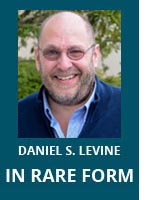 When Jessica Klein-Foglio’s and Michael Foglio’s son Ben was diagnosed in 2017 with Salla disease, an ultra-rare lysosomal disorder, the diagnosis came through a new program that seeks to identify the genetic causes of intellectual disabilities.
When Jessica Klein-Foglio’s and Michael Foglio’s son Ben was diagnosed in 2017 with Salla disease, an ultra-rare lysosomal disorder, the diagnosis came through a new program that seeks to identify the genetic causes of intellectual disabilities.
The program at the Rose F. Kennedy Intellectual and Developmental Disabilities Research Center at Albert Einstein College of Medicine, working with NYCKidSeq, is known as Operation IDD Gene Team. It uses whole genome sequencing, collaborative research, and direct communication with families to find disease-causing mutations linked to intellectual disabilities and enlists scientists there in an effort to advance research toward treatments.
Ben was the first patient to have a gene identified through the program. Once that happens, the program’s director Steven Walkley sends out an email to about 100 researchers at Einstein to explain the findings, what may be known about the gene and the condition, and see if any scientists are interested in working on the research. The program, a little more than a year old, is regularly finding new genes linked to intellectual disabilities.
“We’re batting about 100 percent,” said Walkley. “We’ve done this for about a dozen genes. Almost always someone is interested. Usually one key faculty member comes forward, maybe two.”
Once the gene is identified, the researcher will put together a presentation and spend about two hours explaining in lay terms to the family the biology underlying the child’s disease. Salla is a lysosomal storage disorder first identified in Finland about 35 years ago, but research on the condition stalled long ago.
The condition primarily affects the nervous system. It involves defects in a protein called sialin, which is needed to move a substance called free sialic acid within cells. Symptoms are due to the toxic build-up of sialic acid in the cells, particularly in the nervous system. Approximately 130 individuals are believed to currently be diagnosed with Salla disease, mostly in Finland and Sweden, with less than a dozen known cases, thus far, in the United States.
When the family first met Walkley with their neurologist Melissa Wasserstein, he made an off-hand comment that unlike some other rare conditions, there was no foundation for Salla disease and they might want to consider starting one.
“There may be a Facebook groups for these diseases where there are obscure genes that affect kids, but there’s no foundation and no active push to raise money,” said Walkley. “We’re trying to help these families understand the disease and, in anyway we can, be creative in coming up with some support and see what happens. I didn’t expect a Salla disease foundation to grow out of that tutorial, but it did.”
At the time, Klein-Foglio felt a bit overwhelmed. She was taking Ben to 21 sessions a week for physical, speech, vision, occupational, and other therapy sessions. She said she just wanted to focus on her son, but six weeks later she called Walkley and said she was starting a foundation.
The Salla Treatment And Research Foundation (STAR) was soon up and running, had identified 20 patients with the condition, and raised enough money for Walkley and Wasserstein to organize an International Think-Tank meeting on Salla disease with researchers from the United States and Europe that was held in Tarrytown, New York in September 2018 to discuss research strategies towards a therapy.
Klein-Foglio, a professional opera singer and graduate from The Juilliard School, is using her music industry contacts to raise money. She’s put together a silent auction and benefit December 12. The money raised by the event, along with a $30,000 donation from a Salla family in Switzerland and another $30,000 previously raised, will be used to fund a $100,000 post-doctoral position at the National Institutes of Health to do research on Salla disease.
The post-doc will work under William Gahl, the director of the National Human Genome Research Institute, who did work that led to a small molecule drug that helped transport sialic acid out of cells in patients with cystinosis, a rare metabolic disease. Alternatively, a gene therapy is viewed as a potential therapeutic approach in Salla disease.
“As I thought about it, I thought, ‘Gosh, I’m not performing now, but maybe there’s a reason for having gone to Juilliard.’ I spoke to some friends, and they were all on board for doing some concerts for Salla disease,” said Klein-Foglio. “I said, ‘Okay, I think I can do this. I have a platform and I should use it. It’s not going to be anybody else, so I’ve got to be the one who does it.’”
Klein-Foglio has no regrets about starting the foundation but says she does feel the weight of everyone’s diagnosis and feels pressure to deliver results. Nevertheless, she the foundation has made progress at a much faster pace than she could have imagined.
“You can go down the road of despair or hopelessness,” she said, “or give yourself a purpose amidst that diagnosis.”
December 11, 2018
Photo: Ben, Jessica, and Michael Foglio

Stay Connected
Sign up for updates straight to your inbox.
